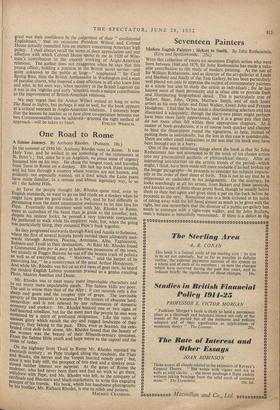One Road to Rome
A Sabine Journey. By Anthony Rhodes. (Putnam. 18s.)
IN the summer of 1950 Mr. Anthony Rhodes went to Rome. It was Holy Year, and he wished to see something of the ceremonies at St. Peter's ; but, since he is an Anglican, no pious sense of urgency hastened him on his way. He chose the longest road, and travelled from Terni to Rome on a donkey. His last lap took three months, and led him through a country where tourists are not known, and evidently not especially wanted, yet a land which the Latin poets have made familiar, in a remote and almost legendary way, to us all : the Sabine Hills.
At Terni the people thought Mr. Rhodes quite mad, even by English standards, to want to go on bad roads on a donkey when he might have gone on good roads in a bus, .and he had difficulty in persuading even the most unattractive nudattiere to let him hire his Pepe. Eventually the muleteer went with Mr. Rhodes to Romc, more as custodian of the beast than as guide to the traveller, and, despite his sinister looks, he proved a very tolerable companion. He preferred to walk while his employer rode, but, when the going was particularly tiring, they mounted Pepe's back together.
So they progressed eastwards through Rieti and Aquila to Sulmona, where the first of several hairpin bends carried them ultimately east- wards through Anversa, Pescina, Avezzano, Albe, Tagliacozzo, Subiaco and Tivoli to their destination. At Rieti Mr. Rhodes found a Communist festa per la pace in boisterous possession of the town, but already at Poggio Bustoni he was off the beaten track of politics as well as of everything else. " Welcome," said the keeper of its uninviting inn, " to a countryman of the great Arthur Henderson." And while Mr. Rhodes was fed on an evil mess of goat stew, he heard the modest English Labour statesman praised as a genius excelling Plato, Marcus Aurelius and Dante.
Mr. Rhodes was to meet many more improbable characters and to eat many more unpalatable meals. The Sabine Hills are poor.
The soil is worse than that of the Alps ; it can nourish only a few sheep and goats and the rougher type of grape. The inevitable poverty of the peasants is worsened by the system of absentee land- ownership, and is not relieved by any refinements of domestic economy and cookery. Mr. Rhodes noticed one or two signs of half-hearted rebellion, but for the most part the people he met were sustained by a spirit of profound resignation. Like the ruins of ancient glory which enrich the dry and rugged landscape of their country, they belong to the past. Thus, even in Scanno, the cele- brated cilia dells belle donne, Mr. Rhodes found that the beauty of the women was the beauty of their fifteenth-century costumes. From the Sabine Hills youth and hope move to the capital and the cities of today.
On the highway from Tivoli to Rome Mr. Rhodes rejoined the twentieth century ; as Pepe trudged along the roadside, the Fiats and Buicks, the lorries and the Vespas hurried noisily past ; but, since it was Italy still, the prospect of two men and a donkey occa- sioned neither interest nor surprise. At the gates of Rome the muleteer, who had never been there and had no wish to go there, withdrew with Pepe, and Mr. Rhodes was left, in the company of cardinals and film-stars and black-marketeers, to write this engaging account of his travels. His book, which has handsome photographs by his brother, Mr. Richard Rhodes, is one to relish and possess.
MAURICE CRANSTON.


















































 Previous page
Previous page